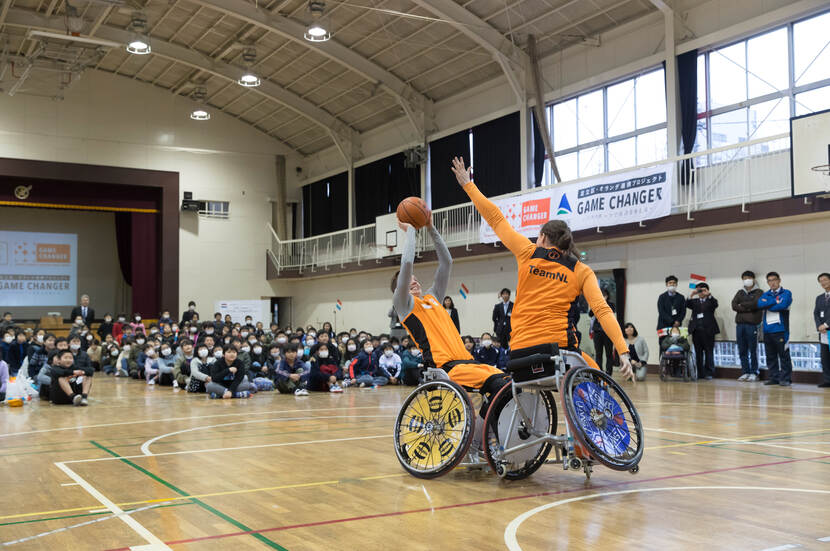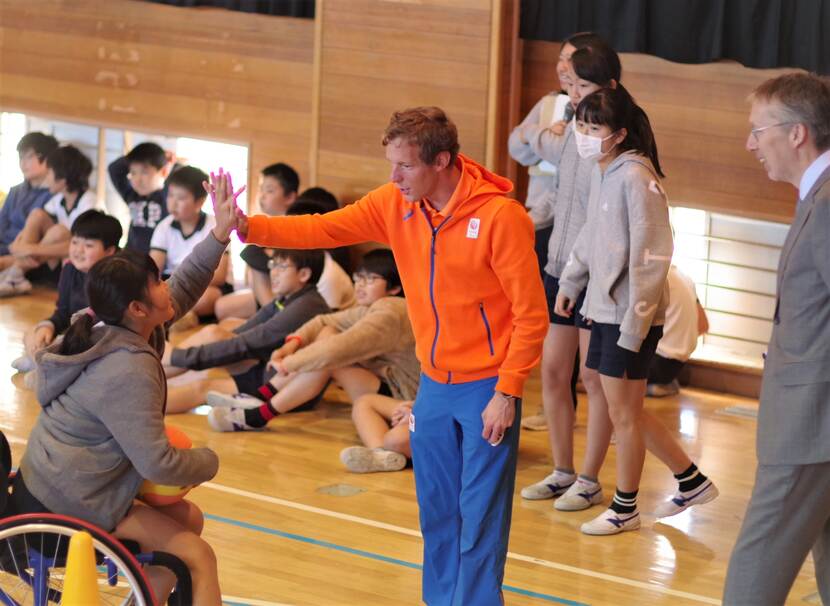Game Changer project: creating more opportunities for people with disabilities
The Netherlands Olympics Committee (NOC*NSF) has joined forces with the Dutch Embassy in Tokyo, the Japan Sport Council and three Tokyo districts in the Game Changer project. The project uses sport as a way of helping people with a disability to better integrate into Japanese society. ‘In the Netherlands, people with and without disabilities do sport together. In Japan, that’s unheard of.’

In Japan, most public transport, buildings and sports facilities are accessible to people with disabilities. However, from a Dutch perspective integration is lagging behind. People with disabilities, and their families, are often reluctant to participate in public life. All too often, Japanese society is at a loss when it comes to how to accommodate their needs. ‘It occurred to us that the Netherlands might be able to inspire Japan,’ says Herbert Wolff, Head of International Relations at NOC*NSF.
Self-confidence and integration
Sport is an ideal way of boosting the self-confidence of people with a disability, making it easier for them to integrate in society and expanding and reinforcing contact between people with and without disabilities. And the Netherlands can lead by example, says Wolff. ‘For example, Dutch disabled and able-bodied athletes train together. This is unheard of in Japan, where having disabled athletes train separately is seen as the best way of addressing their needs.’
The difference in attitudes towards sport and disability between the Netherlands and Japan is also reflected in specific legislation and regulations. For example, in Japan municipalities are required to take out extra insurance for sport halls used by people with a disability. ‘In Japan, the focus is primarily on what people with a disability can’t do,’ says Wolff. ‘And on the special measures that need to be taken. The concern that disabled people might injure themselves creates an obstacle to disabled and able-bodied people doing sports together. In the Netherlands, we focus much more on abilities: what can people with a disability do, and what do we need to put in place so that we can all train together? This is a very Dutch idea. By the same token, it’s also normal here for older people and younger people to do sport together.’
Exchange
Game Changer is the second NOS*NCF social project designed to help make a lasting change in an Olympic and Paralympic host country. The first was in Rio de Janeiro, where the project on sport for young people from Rio’s slums, the favelas, was a resounding success. The second project originated in 2016 when Wolff contacted the embassy in Tokyo.
In 2017, shortly after the games in Brazil ended, NOC*NSF and its Japanese partners signed a cooperation agreement for the project at the Dutch ambassador’s residence. Since then, Dutch athletes with disabilities and Dutch experts on sport for the disabled have been regularly travelling to Japan. For the past year and a half these exchange visits have been held online due to the coronavirus pandemic. Japanese delegations have also visited sport facilities in the Netherlands. The goal is informing and inspiring people about sport for those with a disability. The embassy has been involved in a number of ways, such as facilitating contact between the parties (there are often cultural as well as linguistic barriers to overcome) and organising meetings like the online seminar to be held on 19 August (link).

Cultural and linguistic barriers
The embassy has been involved in a number of ways, such as facilitating contact between the parties (there are often cultural as well as linguistic barriers to overcome) and organising meetings like the online seminar to be held on 19 August (link).
Some of the Netherlands’ top athletes have visited sport facilities and schools for the disabled in Tokyo. Wolff has a vivid recollection of the first visit to the Japanese capital. As part of that trip, Kelly van Zon, two-time gold medallist in table tennis at the Paralympic Games and competing again in Tokyo, visited a school for children with disabilities. She played a match with the headmaster of the school, an experienced table tennis player without a disability. ‘Kelly won, and that clearly made a big impression on the children,’ Wolff said. ‘They saw for themselves that they could excel in sport despite a disability, that they were not inferior to able-bodied people and that they could be winners.’
Opportunities and contacts
Meanwhile, NOC*NSF is already looking ahead to the 2024 Games in Paris and the next project. ‘Next time round, we want to get the Dutch business sector involved,’ says Wolff. ‘These projects have emerged from a sense of social engagement, but they also present opportunities. The embassy in Tokyo told me that the Game Changer project opened doors for them and helped the embassy establish contacts that would have otherwise been unthinkable. Long-term commitment has a lot to do with that. So far there have been eight exchanges on location and, since coronavirus restrictions have applied, monthly online workshops. Working together on a project for an extended period with frequent contact has allowed us to really make a difference, and that’s great to see.’
One of the project’s achievements in Tokyo is a scheme allowing people with disabilities to register for sporting activities. ‘The Sport Service Points match sports to individuals with a disability,’ Wolff says. He is very happy with this concept. ‘Japan is not an easy place to get things started. But once something’s established, it generally lasts.’
‘The Game Changer project is not a temporary gimmick; we want to be part of a lasting movement that changes awareness of sport for people with disabilities, and in doing so, creates a more inclusive society,’ says Theo Peters, deputy head of mission in Tokyo. ‘We’ve been working with NOS*NSF for five years, and it’s great to see the close network in Japan and the Netherlands that has resulted. It feels like we’ve made a real contribution, in the spirit of the Games, which is also meaningful in the wider context of our human rights and inclusiveness agenda.’
Open and happy
The Game Changer project has been extended to March 2022. Wolff hopes that in the coming six months at least one or two more exchanges in person will be possible. ‘Tokyo would really like to see our medal-winners from the Paralympics return to the city. So we’re looking into that.’
What made the biggest impression on the Japanese during the exchanges? Wolff reflects for a moment before replying. ‘I think that they were amazed by how happy and open disabled athletes and people are in the Netherlands. In Japan, being disabled is something sad. It’s a serious subject that borders on the tragic. They were impressed by Dutch sport facilities built for people with and without disabilities. I get the impression that local authorities in Japan feel like they’ve already achieved a lot if a sports centre has a disabled toilet. No-one stops to think that the steps up to the sports centre can be an insurmountable barrier for someone in a wheelchair.’